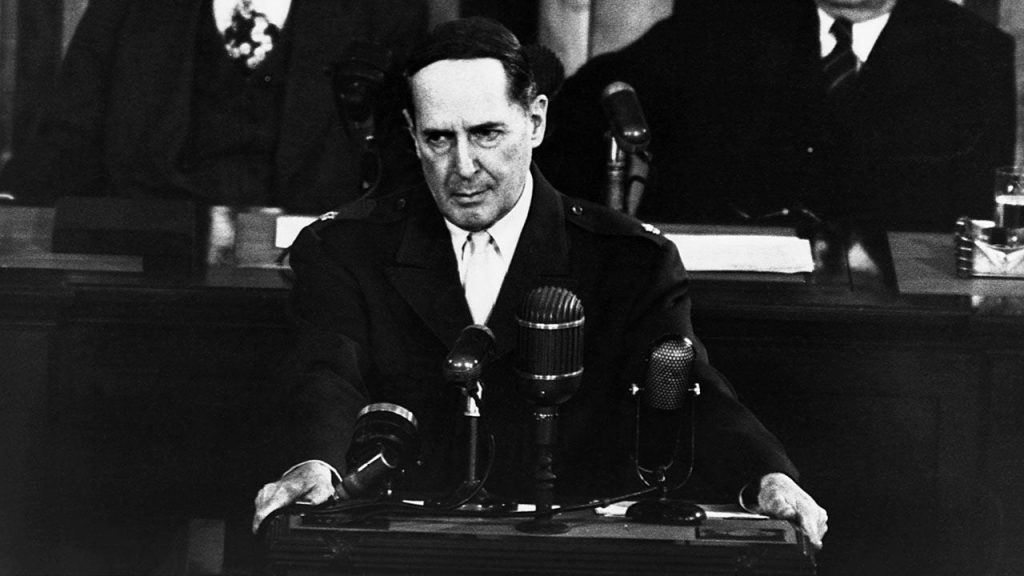On April 19, 1951, General Douglas MacArthur delivered his farewell address to Congress, famously stating, “Old soldiers never die; they just fade away.” This speech came eight days after he was relieved of his duties as general of the U.S. Army by President Harry S. Truman, ending his distinguished military career. Reflecting on his 52 years of service, MacArthur expressed nostalgia for his younger days when he first joined the Army and shared his disappointment at how the world had changed since then. He referred to an old army ballad in which it was said that old soldiers never die; they just fade away. MacArthur’s dismissal was a result of repeated clashes with Truman over strategy in the Korean War, as MacArthur preferred a more aggressive approach to combat communism in Asia.
Born in Little Rock, Arkansas in 1880, MacArthur graduated from the U.S. Military Academy West Point in 1903. After retiring from the U.S. Army in 1937, MacArthur was called back into service by President Franklin Delano Roosevelt to lead the newly created United States Army Forces in the Far East as the situation in the Pacific worsened. Forced to flee the Philippines for safety in 1942, MacArthur was presented with the Medal of Honor for his exceptional leadership and bravery during the conflict with invading Japanese forces. Republican groups attempted unsuccessfully to nominate MacArthur for the presidency in 1944, 1948, and 1952. Following his retirement from military service, MacArthur served as the board chairman of the Remington Rand Corporation and lived in seclusion in New York City until his death in 1964, where he was buried in Norfolk, Virginia.
MacArthur’s dismissal came after disagreements with Truman over the strategy for the Korean War, with MacArthur advocating for a more aggressive approach to combat communism in Asia. Despite his disputes with the president, MacArthur’s leadership during his military career garnered respect and admiration from the American public. He led Americans into combat for fifty years, with victories and defeats that captured the nation’s imagination. MacArthur was known for his courage and extreme self-confidence, challenging anyone who questioned his military judgment, including the president of the United States. His legacy as a decorated military leader and his decades of service to the country solidified his place in American history.
MacArthur’s military career began with his graduation from West Point in 1903, fulfilling his dreams of joining the Army. Throughout his years in service, MacArthur led troops in various conflicts, earning accolades for his leadership and bravery. His time in the Philippines during World War II saw him preparing the islands to resist Japanese conquest and leading his troops with heroic conduct. Upon receiving the Medal of Honor in 1942, MacArthur’s exceptional disregard for personal danger and calm judgment under fire inspired his troops and galvanized the resistance of the Filipino people. His unwavering dedication to his duty and the American people solidified his place as one of the most revered military leaders in American history.
Despite his retirement from active duty in the U.S. Army in 1937, MacArthur was called back into service by President Roosevelt in response to the escalating tensions in the Pacific. Leading the United States Army Forces in the Far East, MacArthur faced challenges and sacrifices, including fleeing the Philippines for safety in 1942. His steadfast leadership and contribution to the defense of the Philippines against Japanese invasion earned him international acclaim and the Medal of Honor. Following his military career, MacArthur declined attempts by Republican groups to nominate him for the presidency and lived in seclusion in New York City until his death in 1964. His burial in Norfolk, Virginia, marked the end of a legendary military career that left an indelible mark on American history.


